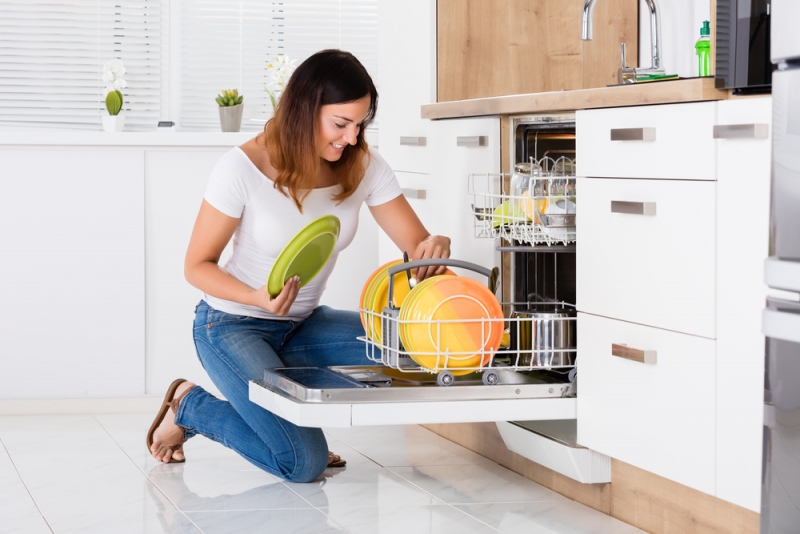There are many myths that lead people to believe hand-washing dishes is better than using a dishwasher, but there can be serious consequences to doing things the old-fashioned way. Here are the top three reasons:
Foodborne Pathogens
Salmonella and Campylobacter are the top two bacterial causes of diarrhea in the United States today. These and several other forms of bacteria find their way into your kitchen via raw meat, eggs, certain kinds of dairy, and even fresh fruit; they can be present on cutting boards, knives and plates, and they can breed in your sink and cleaning items like sponges and scrubbers. While you might use products like bleach or Lysol on your countertops and other kitchen surfaces, these products cannot be used on serving ware, which leaves extremely hot water, and plenty of it, as your only option for killing these bacteria.
Naturally, you couldn’t handle boiling water during hand-washing, but dishwashers can safely cycle up to bacteria-killing temperatures multiple times while cleaning your dishes. Furthermore, you aren’t smearing additional bacteria on your dishes as you hand-wash them while using sponges or scrubbers, which can serve as petri dishes for multiple species of germs and bacteria, resulting in that typical unpleasant odor. Plan on cleaning these types of items regularly and replacing them frequently if you use them to clean your dishes.
Skin & Nail Problems
Whether or not you wear gloves, exposing your hands to extremely hot water daily can take its toll on your skin and nails. Chronic dermatitis and eczema rashes can easily be triggered by this activity, dry skin or cracked nails can be exacerbated, and, in some cases, your sink can be a perfect environment for fungi like tinea, which causes a rash best known as athlete’s foot.
If you visit the nail salon frequently, daily dishwashing in addition to your daily shower can significantly reduce the life of your manicure, even if you wear gloves. Plan on spending more to keep hand lotion in stock as well as topical creams to help with dermatitis or other issues as well, and keep a spare pare of kitchen gloves handy for when your current pair gets punctured or cut.
Conservation
In terms of water use, a thorough round of dishwashing using food-safety standards can use between 25 – 30 gallons of hot water. Compare this to an energy-efficient dishwasher, which uses between 3 – 5 gallons per wash, then multiply that by the number of days in a year you typically wash dishes, and you will likely see a significant savings in terms of both energy and water use. Additionally, if you only run your dishwasher when it is full, which might be spread out over a few days to a week, you will save even more on your utility bill.
Many people pre-rinse, but this generally amounts to an additional waste of water. Your dishwasher is typically connected to a garbage disposal, which can keep food waste and bacteria safely away from common surfaces, though significant debris should be scraped into the garbage. If your sink doesn’t have a garbage disposal, a quick call to a local plumber like Apollo Drain may reveal that the cost for an install is lower than you might have imagined and may help you save money in the long run by reducing your water use.
Couple this with the savings you’ll accrue from not purchasing as many disposable items like sponges and gloves, preserving your manicures, or reducing your need for lotion or treatments, as well as the significant reduction of foodborne pathogens in your kitchen, and it becomes evident that it just doesn’t pay to hand-wash dishwasher-safe items.
















